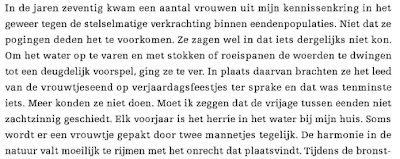Bird concentrations and species counts
When the ponds and canals freeze the birds concentrate in the last open spots. These bird concentrations invite basic analysis. Just simple observation and counting during two weekends:
In the open country - furthest from the suburbs:
11 swans (4 juveniles) - 5 ducks (3 male, 2 female) - 5 coots
In the open country - nearer to the suburbs:
47 coot - 1 crested grebe - 1 black headed gull

Inside the suburbs:
15 coot - 7 common moorhen - 131 ducks (83 male, 48 female) - 4 black headed gulls
Inside the suburbs:
Morning: 1 blue heron - 4 common coot
Afternoon: 2 common coot - 16 black headed gulls
Inside the suburbs: 97 black headed gulls - winter plumage
There are a few bigger-looking birds but I'm not sure they are different species - they might be herring gulls but I don't think they are really there
Inside the suburbs:
Morning: 5 ducks (male) - 4 ducks (female) - 5 jackdaws - 28 black headed gulls - 18 common moorhen - 10 common coot - 1 swan - 8 geese
Afternoon: 27 ducks (male) - 13 ducks (female) - 2 common coot - 2 swans - 5 geese
Inside the suburbs:
14 ducks (male) -10 ducks (female) - 1 common moorhen - 2 common coot - 6 egyptian geese
Analysis - did we learn anything?
The number of water bird species in (and around) the suburbs is very low. We counted only 9 species.
- Ducks and seagulls are the most numerous birds.
- There is no striking difference between open country bird populations and suburban bird populations. Only the crested grebe has not yet invaded the suburbs, it is seen only in non-urban areas.
- The difference in numbers of male and female ducks is striking: 2 males for 1 female.
- The population of a water hole varies significantly during one day.
And did we get any new questions for further research? Not many:
- Do birds congregate in preexisting open water holes? Or do they keep the water hole open by swimming there?
- How does the bird population vary during the day? Which birds come and go? Where do they go?
- What causes the difference in duck sex numbers? Births? Deaths?
- Do these birds stay in the suburbs in the spring? Or do they leave for the open country?
- Why are some birds in the water (doing nothing much) and other birds on land (doing nothing much)? Why do gulls just sit on the ice doing nothing? Why don't they all swim in the water?
Ducks and sex
Obviously ducks are the dominant birds of the suburbs. The difference in numbers of males and females is surprising! But it is correct - I counted very carefully. And I've seen it in smaller ice ponds in the suburbs too: (7 male, 5 female), (2 male, 1 female).
The asymmetry in duck sexes has been noticed by other observers. Amsterdam park administrators say that you should not feed ducks. If you do feed ducks the males have nothing to do and they keep stalking and bothering the females. Many female ducks are drowned that way. On some websites this theme is spun into Victorian prudishness:
Feeding ducks during mating season is very ill-advised. Ducks get bored. And where can you find the best entertainment as a sex crazed duck? By playing your most beloved game: seduction, mating, and stirring up trouble. The females play the males off against each other, which results in frequent and heavy fighting. Not every duck survives the fight intact.An ironic observation on the sex life of ducks and the morality of men was written by Theo Jansen in his book "The great phantasist":
In my rough translation that does the original no credit:
In the seventies some women I knew started to agitate against endemic rape in duck communities. Not that they tried to prevent it. They understood that succesful measures were unrealistic. To navigate the waters in a vessel and to force the male ducks to practice sound foreplay - by use of sticks or oars - that went too far. Instead of acting they started to discuss the plight of female ducks at birthday parties - at least that was something constructive. They could not do more.
I have to admit that the mating of ducks is not a tender ritual. Each spring there is a lot of noise in the water near my house. Sometimes a female is mounted by two males at the same time. Harmony in nature goes hand in hand with injustice.
Sources:
De grote fantast - Theo Jansen
http://www.sovon.nl/pdf/StadsvogelbalansVBN2009.pdf - City bird statistics









No comments:
Post a Comment